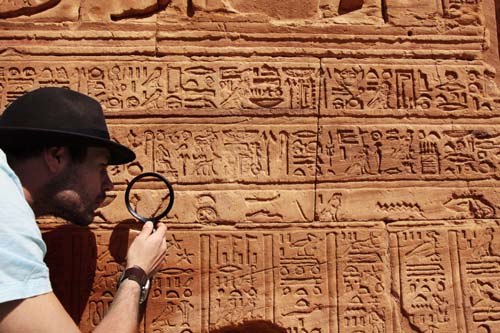Archaeology
✶ Many people think that Archaeology and Palaeontology are one and the same. Palaeontology is the study of Fossils. Archaeology focuses on the Lifestyles and Cultures of individuals, which includes understanding past cultures based on the available evidence and studying changes in human lifestyles over time. Their work is to study past Cultures by analysing the remains of long ago, such as Bones, Clothes, Dishes, Monuments. If you want to become a Professional Archaeologist, then you have to get gain deep knowledge in History and Geography.
✶ Archaeologists strive to find the unknown facts about past humans and the reasons behind changes in their behaviour and cultural events. One can explore more in this field because there are many career opportunities in this interesting path. The aim of Archaeologists is to come up with new truths through the Identification and Uncovering of Historical sites.

✶ The range of Archaeology is very wide. It includes the study of Ancient Texts/ Papers, Musicology, Stamp/ Coinage, Inscriptions and other Scripts. It is also considered a branch of Anthropology. Experts related to this field are called Archaeologists. One can step into this career by doing courses relating to this field.
Branches of Archaeology:
There are many branches of Archaeology:
1. Classical Archaeology: Research and study of ancient Greek, Roman, and other contemporary Civilizations.
2. Historical Archaeology: Study of Artifacts, Documents, etc,. of Antiquity.
3. Underwater Archaeology: Study of submerged artifacts and underwater sites of the past human cultures at the bottom of the ocean.
4. Ethnoarchaeology: It focuses on ancient Hunter- gatherer lifestyles. It is the study of the Weapons and tools that were used by Ancient humans and their adaptations.
5. Forensic Archaeology: It investigates Human remains, Personal belongings, Weapons and other evidence buried in the soil in connection with any Crime. Thereby other factors are taken into consideration and the circumstances under which the crime was committed are assessed.
6. Cyber Archaeology: It is an amalgamation of Engineering, Computers, and Natural Sciences. They study past situations using Science and Engineering subjects.
Apart from these, there are other branches such as Modern Archaeology, Prehistoric Archaeology, BioArchaeology, Environmental Archaeology, Urban Archaeology, Landscape Archaeology, Marine Archaeology, Biology Archaeology, etc,.
Courses Availability:
✶ Certificate - 1 Year
✶ Certificate in Epigraphy
✶ Certificate in Archaeology
✶ Certificate in Architecture and Sculpture
Diploma:
✶ Advanced Diploma in Epigraphy
✶ Diploma in Architecture- 3 Years
Post Graduate Diploma in Archaeology:
✶ Bachelor’s - 3 years
✶ B.A in Culture and Archaeology
✶ B.A in Music and Archaeology
✶ B.A in Ancient Indian History and Archaeology
✶ Master's- 2 years
✶ M.A. in History and Archaeology
✶ M.A in Archaeology
✶ M.A in Ancient Indian History and Archaeology
✶ Master of Philosophy in Ancient Indian History, Culture and Archaeology
Eligibility Criteria & Admissions:
❖ For Diploma/ Certificate course, students should have complete 10+2 or Intermediate in any subject (mostly preferred Arts background) from any recognized board. Admission will be done directly to the Institutions offering Archaeology.
❖ For Bachelor's degree (B.A/ B.Sc) students should have done 10+2 or Intermediate in any subject (mostly preferred Arts background) from any recognized board. Duration of the programme is 3 Years. Some of the entrance tests need to take admission are IPU CET, UPSEE, KCET, BHU UET, PUCET, CUEE.
❖ For Master's degree (M.A/ M.Sc) students should have done Bachelor's degree in any relevant subject from any recognized organization. Duration of the programme is 2 Years.
Candidate need to qualify National Entrance Examination for admission. Some of the Entrance tests are CUEE, AUCET, IPU CET etc,.
Fee Structure:
| Course |
Fee Structure |
| Diploma |
INR. 30,000 - 1 Lakh |
| Bachelor’s |
INR. 32,000 - 1.2 Lakh |
| Post Graduation |
INR. 40,000 - 1.5 Lakh |
Top Colleges:
❖ University of Madras
❖ University of Rajasthan
❖ Banaras Hindu University, Varanasi
❖ University of Calcutta
❖ Viswa Bharati University
❖ Kurukshetra University, Kurukshetra (Haryana)
❖ Institute of Archaeology, Archaeological Survey of India, New Delhi
Skills Required:
❖ Good Communication skills
❖ Logical thinking
❖ Photography skills
❖ Patience
❖Observational & Research skills
Careers:
Nowadays, people are showing more interest in studying Ancient history. So, the scope of Archaeology is broad in India moreover as in Abroad countries with high demand. After the completion of Graduation Archaeologist can work in both Public and Private sectors as a Tourist Guide, Interpreters, Heritage Managers etc,. Professionals in this field have an opportunity to work in any office as well as they can join as a Research professor in Education Institutions. Professionals and skilled Archaeologists will be hired in Central and State- level Research Centres with handsome packages.
Here are some of the industries where Archaeologist can work:
❖ Defence Services
❖ Museums
❖ Tourist Departments
❖ Government Departments
❖ Art Galleries
❖ Cultural Organizations
❖ ASI
❖ Educational Institutions
❖ World Heritage Sites
❖ State Government offices
Job Profiles:
After the completion of Graduation, Archaeologist as a fresher can start his or her career with the package of INR. 2.5 Lakh per annum. A person who has done Doctoral programme in Archaeology can start his career with the package of INR. 5 Lakh per annum and more which depends upon his or her Skills, Education, Sector and Position.
Here are some of the job profiles of archaeologist with their respective salaries offered by the various industries:
Job profiles
|
Salaries
|
| Professor |
INR. 4- 8 lakh per annum |
| Archaeologist |
INR. 5- 7 Lakh per annum |
| Museum Curator |
INR. 3- 5 Lakh per annum |
| Heritage Manager |
INR. 3- 6 Lakh per annum |
Top Recruiters:
❖ Archaeological Survey of India (ASI)
❖ Indian Council of Historical Research (ICHR)
❖ National Heritage Agencies
Posted Date: 17/04/2024